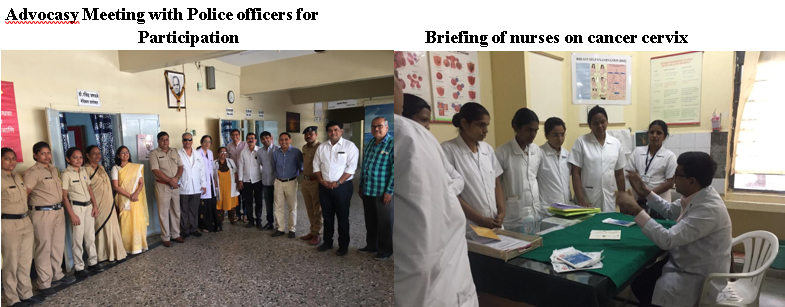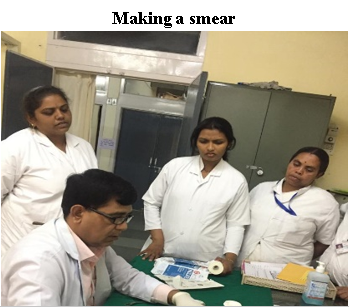
In spite of enormous efforts by the government, the contraceptive prevalence among Indian Rural community continues to remain very low. In rural areas, women start their childbearing soon after early marriage, at times much before the legal age of marriage ie 18 years. The low literacy, poverty and lack of safety for girl children during late adolescence are main reasons for early marriage and resultant childbearing.
Women refuse to use contraceptives for various misbelieves surrounding them. Male counterpart, being equally ignorant about the importance of spacing between two pregnancies, does not use available male contraceptives. Government has put in lot of efforts and money to provide newer, longer acting and reversible methods of contraception in recent times. In India, the government has adopted cafeteria approach for promotion of contraceptives.
Short inter-conceptional periods, especially following operative delivery, ie caesarean section, pose risk to life of the pregnant women, due to risk of scar dehiscence and rupture uterus. Women with short inter-conceptional period are not given trial of vaginal delivery for the fear of scar dehiscence. This itself contributes to rising rate of caesarean section.
Government has implemented various schemes in last decade for promotion of institutional deliveries. Government is providing monitory incentives, food supplements and transport facilities to pregnant women for reaching to the hospital. Rising number of institutional deliveries has provided more opportunities for counselling women regarding contraception and improving utilization of available contraceptive methods.
One of the newer methods of postpartum contraception is a reversible long term contraception ,that is post placental intra uterine contraceptive device, popularly named as PPIUCD. Campaign for promotion of PPIUCD has been undertaken at Pravara Rural Hospital ,where in women are initially counselled during pregnancy regarding benefits of PPIUCD .Brief educational sessions are being conducted in antenatal OPD ,where in short video clips are projected and educational pamphlets are distributed to pregnant women ,giving them information about various contraceptive options and benefits of PPIUCD in particular. The choice of their contraception is obtained and recorded in the antenatal case sheet. Women, who have expressed their willingness for PPIUCD during antenatal period, are re counselled during early labour and written informed consent is obtained for PPIUCD insertion.
The team of doctors has been trained in counselling techniques and PPIUCD insertion. Government has provided two types of intrauterine devices for insertion namely, Copper 375 and Copper 380 A. There has been overwhelming response for acceptance of PPIUCD insertion, especially during caesarean section. More than 300 women have been followed up
during six months period .There has not been any major complication during insertion or post insertion. Women are being regularly followed up for any complications like expulsion, displacement, perforation of uterus or failure of contraception. The method has been found to be very effective, convenient and safe as reversible long term contraceptive for rural women. It will help in improving the spacing between pregnancies. It will result in reducing maternal morbidity and mortality related to frequent childbirth and will also help in improving the child health, as women with PPIUCD will have enough time to look after their small baby, without having physical and psychological stress of new pregnancy and unborn baby.


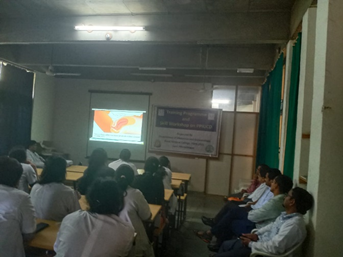


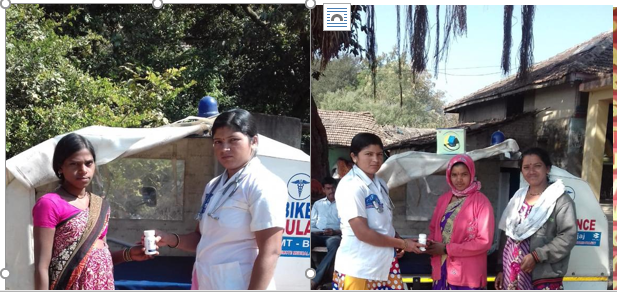 The incidence of under-nutrition and nutritional anemia is very high among rural pregnant population in India.Main reason being inadequate and poor nutritional quality of diet that pregnant women consume. Approximately 52 percent of pregnant women have haemoglobin less than 10 grams. They have multiple micro-nutrient deficiencies like folic acid, calcium, vitamin D, Vitamin B complex etc, which are essential for optimum growth of the fetus in utero and increased demands of woman during pregnancy and lactational period.They belong of underserved and marginalized society. As a result of under-nutrition, these women face multiple complications during pregnancy and labour and in puerperium. (Anaemia, Pre-eclampsia, Urinary tract infection, recurrent abortions ,fetal congenital abnormalities ,preterm labour, intrauterine growth restriction, accidental haemorrhage, postpartum haemorrhage and low birth weight babies).The fetal outcome is also adversely affected by moderate to severe anaemia.
The incidence of under-nutrition and nutritional anemia is very high among rural pregnant population in India.Main reason being inadequate and poor nutritional quality of diet that pregnant women consume. Approximately 52 percent of pregnant women have haemoglobin less than 10 grams. They have multiple micro-nutrient deficiencies like folic acid, calcium, vitamin D, Vitamin B complex etc, which are essential for optimum growth of the fetus in utero and increased demands of woman during pregnancy and lactational period.They belong of underserved and marginalized society. As a result of under-nutrition, these women face multiple complications during pregnancy and labour and in puerperium. (Anaemia, Pre-eclampsia, Urinary tract infection, recurrent abortions ,fetal congenital abnormalities ,preterm labour, intrauterine growth restriction, accidental haemorrhage, postpartum haemorrhage and low birth weight babies).The fetal outcome is also adversely affected by moderate to severe anaemia.
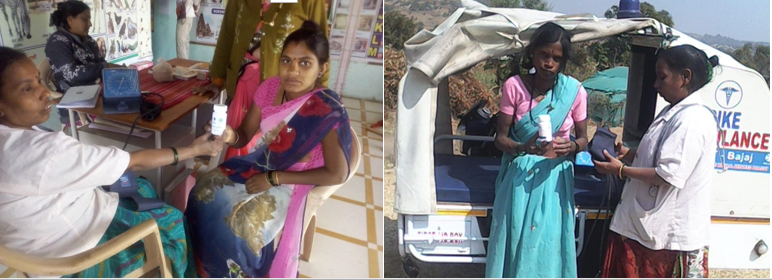 With the in kind donation received from Vitamin Angels, a non profit organization from USA, Anaemia prevention programme is being implemented for tribal and non tribal pregnant rural population at Pravara Rural Hospital, Loni and its peripheral health centres located at difficult to reach areas, where the government health facilities are scanty and inaccessible. The pregnant women receive multi-mineral tablets free for six months period. The distribution is being done at health facilities and through mobile clinics and motor bike ambulances cum clinics in remote tribal areas. The activity has improved the compliance of women for their visits and has shown improvement in their haemoglobin status. Over 6000 pregnant women have been benefited with this programme in two years time. We acknowledge the support received from Centre for Social Medicine ,Pravara Institute of Medical Sciences for helping us to reach the remote tribal population through its outreach activities.
With the in kind donation received from Vitamin Angels, a non profit organization from USA, Anaemia prevention programme is being implemented for tribal and non tribal pregnant rural population at Pravara Rural Hospital, Loni and its peripheral health centres located at difficult to reach areas, where the government health facilities are scanty and inaccessible. The pregnant women receive multi-mineral tablets free for six months period. The distribution is being done at health facilities and through mobile clinics and motor bike ambulances cum clinics in remote tribal areas. The activity has improved the compliance of women for their visits and has shown improvement in their haemoglobin status. Over 6000 pregnant women have been benefited with this programme in two years time. We acknowledge the support received from Centre for Social Medicine ,Pravara Institute of Medical Sciences for helping us to reach the remote tribal population through its outreach activities.
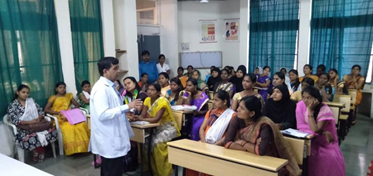
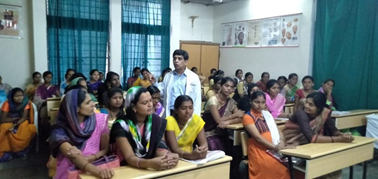
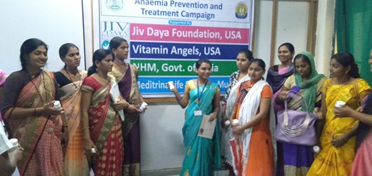
Department of Public health of Maharashtra state has recognized Pravara Rural Hospital, as a training site for its SAB training programme since Jan 2019.It is a 21days residential training, being carried out in the department of Obstetrics and Gynaecology of Rural medical College, Loni . With the help of college of Nursing, a team of six trainers has been formed. The trainers have undergone TOT at regional training centre Nashik. The government provides funds for the activity. Till date, twelve batches SAB (75 nurses) have been trained. The trainee are awarded certificate of course completion by government district training centre of Ahmednagar. The training comprises of “theoretical and practical modules on safe birthing practices”. The trainee use the knowledge and skills at the most peripheral level facility ie. Sub-centre, that caters preventive and primary curative services at village level. This activity has strengthened the quality of existing maternal and child health care services in the region.


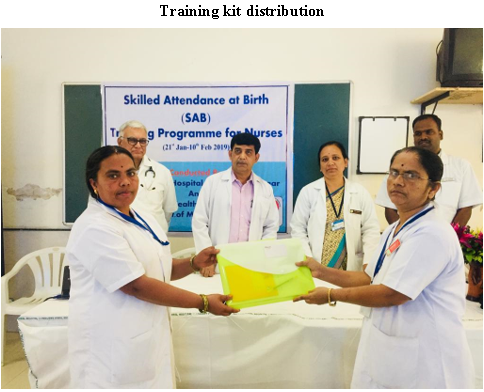
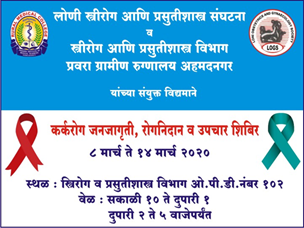 As a part of celebration of International Women’s day on 8th March, screening programme on Cancer Cervix and Cancer Breast was jointly organized the Department of Obstetrics and Gynaecology and department of Surgery of Rural Medical College, Loni, Ahmednagar ,along with Loni Obstetrics and Gynaecological society. Ten Auxiliary nurse midwives were specially trained in taking cervical smears. The specific clientele for this activity was targeted by National Association of Obstetrics and Gynaecology ie FOGSI. The screening programme was specifically meant for the women police officers and their family members. The screening programme was extended for one week from 8th March to 14 the March 2020. One hundred and twenty women were screened for cancer cervix and cancer breast. Sixty women underwent voluntary pap smear examination. Thirty-two women had sono-mamography examination. Women with abnormal findings underwent further evaluation.
As a part of celebration of International Women’s day on 8th March, screening programme on Cancer Cervix and Cancer Breast was jointly organized the Department of Obstetrics and Gynaecology and department of Surgery of Rural Medical College, Loni, Ahmednagar ,along with Loni Obstetrics and Gynaecological society. Ten Auxiliary nurse midwives were specially trained in taking cervical smears. The specific clientele for this activity was targeted by National Association of Obstetrics and Gynaecology ie FOGSI. The screening programme was specifically meant for the women police officers and their family members. The screening programme was extended for one week from 8th March to 14 the March 2020. One hundred and twenty women were screened for cancer cervix and cancer breast. Sixty women underwent voluntary pap smear examination. Thirty-two women had sono-mamography examination. Women with abnormal findings underwent further evaluation.
